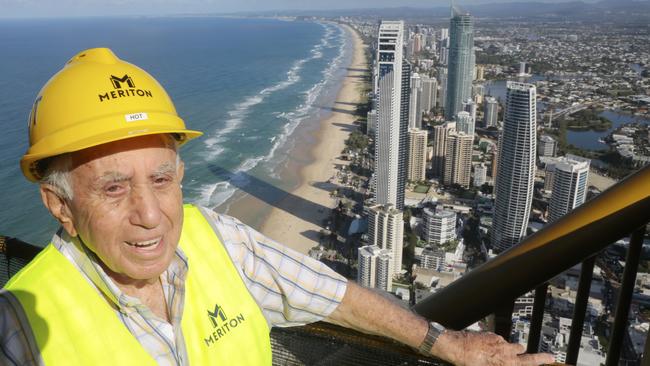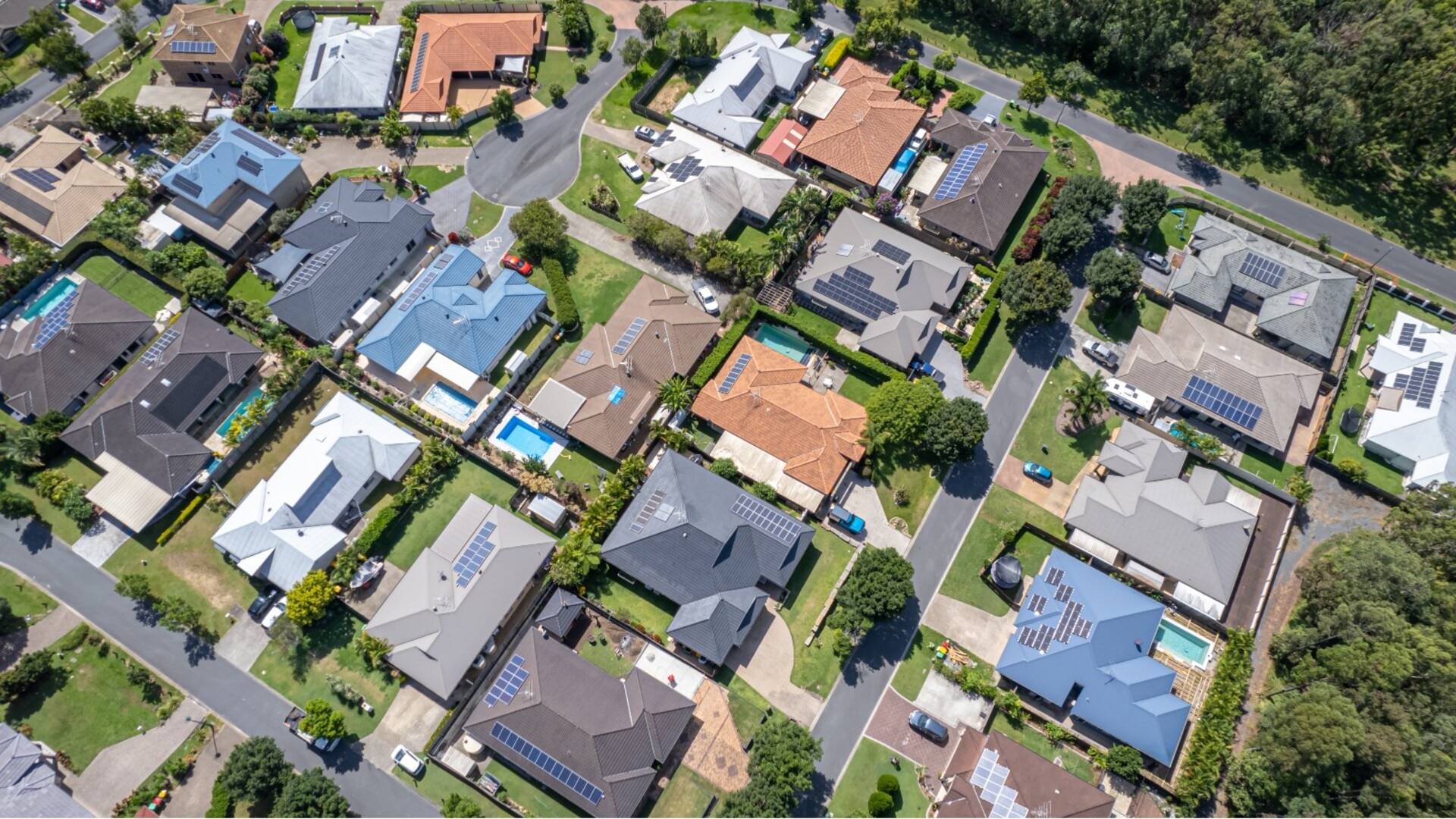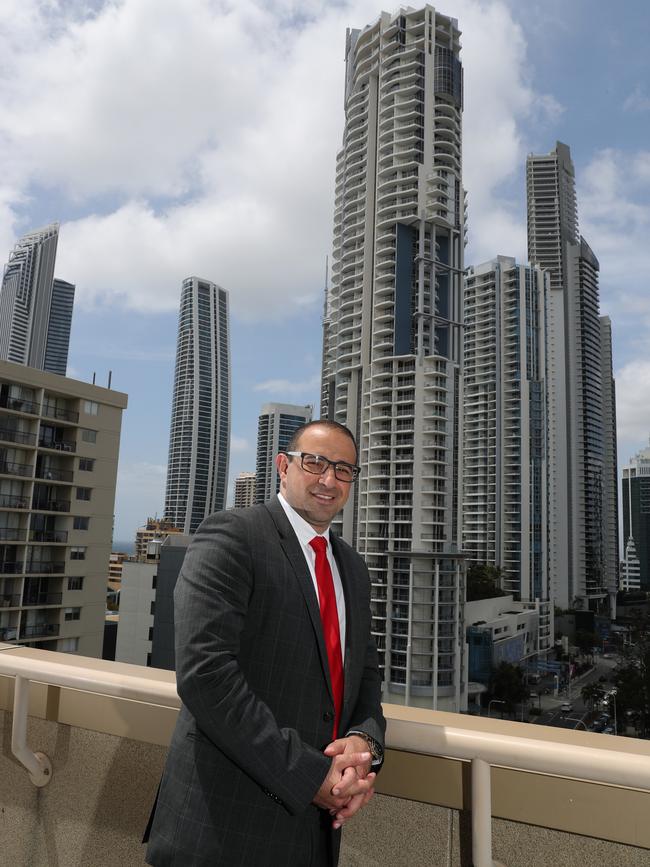Meriton founder Harry Triguboff says Trump tariffs will drive Asian property buyers to Australia
The Meriton founder is demanding a focus on new homes, with other players saying strong policies are needed to break the roadblocks holding the sector back.

Multi-billionaire Harry Triguboff, the largest private apartment developer in the country, said he was surprised by the federal election result but is relieved it’s over so buyers can have certainty which he believes will stimulate the lacklustre housing market.
“It is very helpful that the election is now over because the buyers want to know the future. So, we expect the market to improve because of that,’’ said the property tycoon, who is worth $26bn.
Mr Triguboff backed both sides of politics saying when it came to the housing market he believed both parties’ policies to be reasonable.
“I could never believe there would be such a big difference (in the outcome),” said Mr Triguboff, the founder of Meriton Apartments which develops in Queensland, NSW, the ACT and Victoria.
“I hope that Mr Albanese will agree with us that we need more and more houses and more and more people. Because the country is very big and very rich in raw materials, which the whole world wants,” he said.
The apartment tsar expected volatility in other parts of the world to drive demand for local units but said there was a need for more focus on new homes.
“I think that because of the tariffs that Mr Trump puts on goods entering America prices are going up, sending us more Asian buyers,” Mr Triguboff said. “In the building industry we had a very tough time and I wish that Mr Albanese takes as much interest as he possibly can in housing.”

The Housing Industry Association called on the re-elected federal government to make the sector its first priority. “Any delay or political grandstanding will only deepen the nation’s housing crisis,” HIA managing director Jocelyn Martin said.
“This is a challenge that demands a major response in the first days and weeks of the new term of government,” she said, noting the importance of hitting the targeted 1.2 million new homes.
Ms Martin pushed back against suggestions the housing crisis lay outside the federal government’s remit. “We’ve heard it too often — that housing and planning is a state issue, or that the Commonwealth has limited levers to pull,” she said. “The federal government has the influence, the resources and the leadership role to bring all levels of government together.”
Gold Coast developer Ron Bakir, who is taking his Homecorp Property Group national, said housing policy had “a long way to go”.
“It does really need to be unpacked properly to really understand what levers can be pulled to benefit the average buyer,” he said. “It’s a work in progress from our end to just unpack it properly, because headlines are headlines, but what’s the underlying detail?
“We talk about how we’re bringing a million houses on, but we haven’t done anything to do that. The government needs to work with local enterprise to streamline and get approvals through faster to actually allow delivery of housing as a starting point,” he said. “I think there hasn’t been enough consultation with private enterprise to get that working properly.”

Property Council chief executive Mike Zorbas said the returned government saw its Housing Accord plans as a core promise.
“Australians deserve to see us build national capacity till we comfortably build 240,000 homes year in and year out,” he said.
“Equally, we need to provision for more industrial and commercial projects that support quality of life in our cities.
“Labor’s plans to build 100,000 homes for first-home buyers, fund infrastructure bottlenecks, incentivise utility approvals and fast track tradie qualifications, among other policies, will help boost supply of all city assets,” he said, backing calls for early industry consultation.
Economists suggested the government could use its fresh authority to implement changes.
“With a strengthened majority, the re-elected Albanese government is in a position to prioritise housing reform, accelerate new home completions and deliver on its ambitious commitments,” REA Group senior economist Eleanor Creagh said.
“The industry will be looking for momentum — particularly in unlocking supply and helping first-home buyers into the market.”
She said unlocking Commonwealth land, streamlining planning, and increasing construction worker volumes were all welcome steps toward easing Australia’s chronic housing under-supply. “But timely delivery will be crucial if the newly re-elected government is to meet its ambitious housing targets, especially given the current pipeline constraints in construction,” Ms Creagh said.
Urban Taskforce Australia chief executive Tom Forrest said having a strong majority government was a blessing.
“The Coalition’s abject performance on both policy development and campaigning has delivered Labor a solid mandate. The public repudiation of the Greens was also a salient lesson to those that seek to hold up legislation that supports housing supply,” he said.
“The key now is for the government to strike while the iron’s hot. If legislation is needed to support the delivery of Labor’s $10bn, 100,000 new homes commitment — then pass it through the parliament now and get on with it.”
Notably, the nation continues to be a long way behind Housing Accord targets. Mr Forrest said the government should fast track the funding and delivery of the infrastructure projects which were promised across the nation.
“The Commonwealth must support the delivery of infrastructure that links existing infrastructure assets with growth opportunities for housing supply. That’s what the Albanese government promised – so now’s the time to deliver,” he said.
More Coverage
Originally published as Meriton founder Harry Triguboff says Trump tariffs will drive Asian property buyers to Australia




